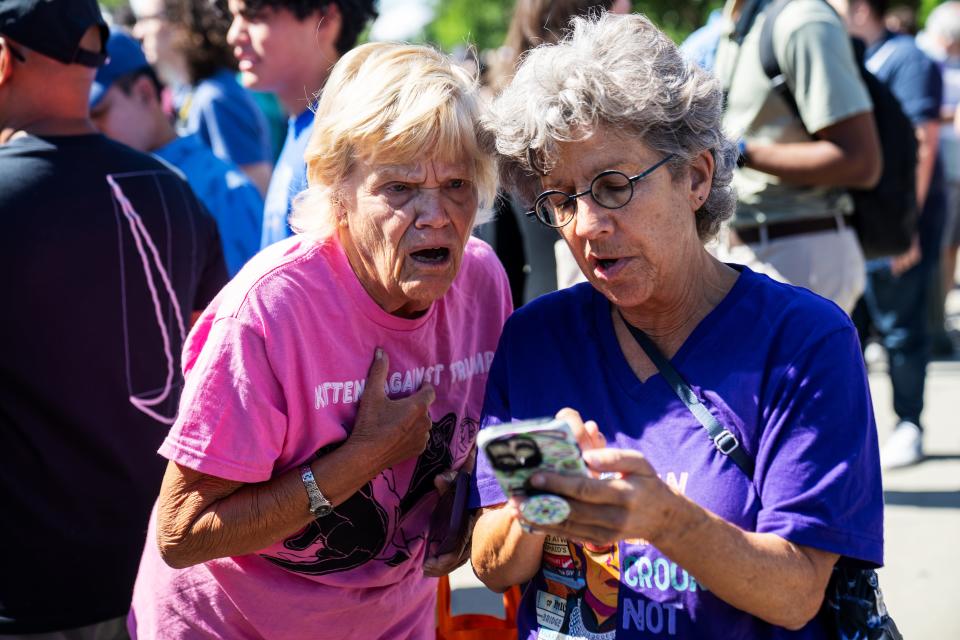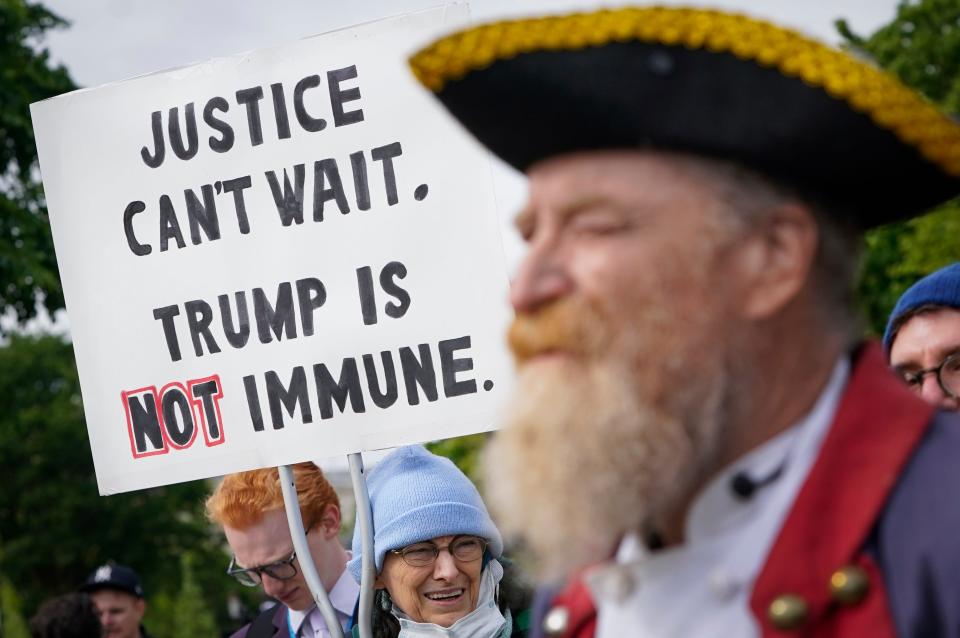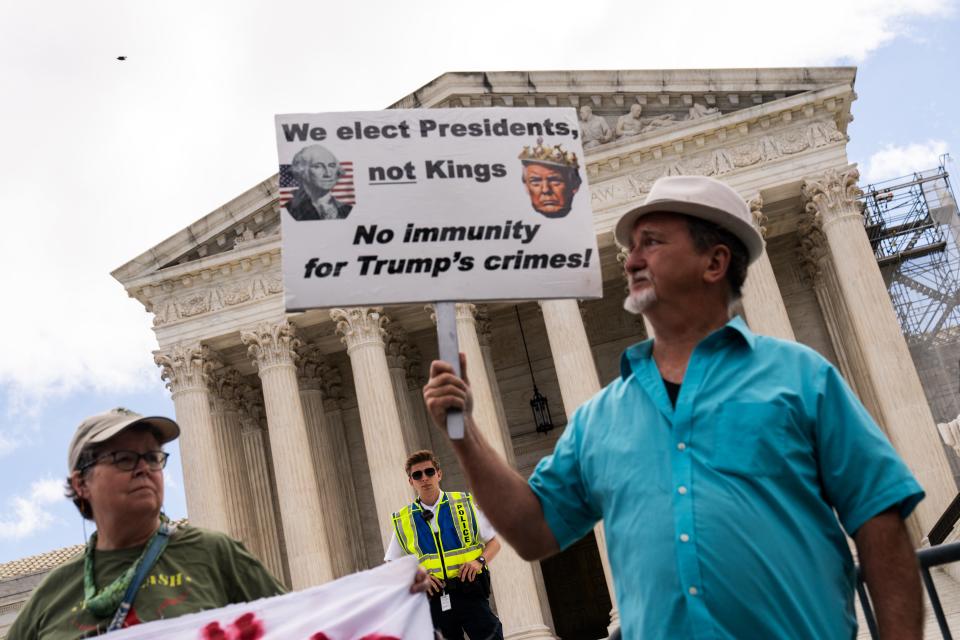In historic ruling on presidential immunity, Supreme Court says Trump can be tried for private acts
WASHINGTON ? The Supreme Court ruled Monday that former President Donald Trump can be tried for any of his efforts to overturn his 2020 loss that were not taken in his official capacity, a decision that likely came too late for a trial to be completed before Election Day.
Deciding for the first time whether presidents are immune from criminal prosecution, a divided Supreme Court said “official” acts taken by a president are protected but not steps he took as a candidate.
“The parties before us do not dispute that a former President can be subject to criminal prosecution for unofficial acts committed while in office,” Chief Justice John Roberts wrote for the 6-3 majority that divided along ideological lines. “They also agree that some of the conduct described in the indictment includes actions taken by Trump in his unofficial capacity.”
Justice Sonia Sotomayor, in a dissent joined by Justices Elena Kagan and Ketanji Brown Jackson, said the majority’s decision “makes a mockery of the principle, foundational to our Constitution and system of Government, that no man is above the law.”
Sotomayor said the court gave Trump “all the immunity he asked for and more.”
"With fear for our democracy, I dissent," she wrote.
Roberts criticized the dissenters for doomsaying rather than acknowledging the lower courts will determine whether Trump’s conduct is vulnerable to criminal charges.
“As for the dissents, they strike a tone of chilling doom that is wholly disproportionate to what the Court actually does today – conclude that immunity extends to official discussions between the President and his Attorney General, and then remand to the lower courts to determine ‘in the first instance’ whether and to what extent Trump’s remaining alleged conduct is entitled to immunity,” Roberts wrote.
Trump, on Truth Social, called the decision a “BIG WIN FOR OUR CONSTITUTION AND DEMOCRACY.”
The case was a crucial test for the court and its six conservative justices, half of whom were appointed by Trump.
The time it took the high court to issue its opinion leaves a tight timeline to hold a trial that was originally scheduled for March. If Trump wins the election in November, he could order the Justice Department to dismiss any federal case against him. Justice Department special counsel Jack Smith indicted Trump last August on four charges, to which he has pleaded not guilty.

Trump is accused of trying to steal the 2020 election by spreading lies about election fraud and attempting to persuade state officials, his vice president and Congress to prevent the certification of the legitimate results.
Trump, the first president – former or current – to be criminally charged, argued he can't be prosecuted for actions he took in his official capacity during his administration, an extension of the reasoning the Supreme Court used in 1982 when it barred civil suits against a president for official actions. Otherwise, Trump's attorneys argued, the threat of future prosecution and imprisonment would destroy the strength and authority of the presidency by subjecting them to politically motivated prosecutions.
Roberts said presidents are not above the law.
“But under our system of separated powers, the President may not be prosecuted for exercising his core constitutional powers, and he is entitled to at least presumptive immunity from prosecution for his official acts,” he wrote. “That immunity applies equally to all occupants of the Oval Office.”
A New York jury in May found Trump guilty of falsifying business records to hide a hush money payment to porn star Stormy Daniels ahead of the 2016 presidential election. The state judge had rejected Trump’s effort to delay that trial until the Supreme Court ruled on the immunity question.
Trump also has claimed immunity in his federal case in Florida for allegedly hoarding classified documents after leaving the White House and in his election interference case in Georgia.
'Deeply disturbing'
David Becker, a former senior trial attorney in the voting section of the Justice Department’s civil rights division, called the high court's decision “deeply disturbing” and “really striking” for what it would allow a president to do in office and remain unchallenged criminally.
Presidents, he said, would have immunity from interactions with an attorney general, even if that means pressuring him to change election results or ordering SEAL Team 6 to kill a political opponent.
“The way I read this opinion is it could be a road map for (presidents) seeking to stay in power,” Becker said. “It could put into question whether or not future peaceful transfers of power occur.”
Robert Mintz, an expert on white collar criminal defense at McCarter & English, said the decision created more heat than light.
“Rather than finding either clear immunity or no immunity for alleged criminal conduct, this new standard will unquestionably lead to protracted hearings and further appeals as the lower courts have to now grapple with the question of which allegations in the indictment constitute official acts,” Mintz said.

First ruling on criminal immunity
In January, a three-judge panel of the D.C. Circuit Court of Appeals unanimously rejected Trump's claim of absolute immunity. But the Supreme Court stepped in to decide for the first time if there are barriers to the criminal prosecutions of presidents.
The court had previously said presidents are immune from civil lawsuits for official actions taken while president, though not from lawsuits tied to their personal behavior.
Smith, the special counsel, argued presidents can still function effectively without criminal immunity, a protection he said neither the framers of the Constitution nor any other president contemplated.
And even if a former president has some immunity, Smith said, trying to thwart the peaceful transfer of power is a perfect example of conduct that should not be protected from prosecution.
During more than 2? hours of oral arguments in April, several conservative justices signaled they were more focused on how a ruling would affect future presidents than ? as Justice Brett Kavanaugh put it ? the "here and now of this case."
“We’re writing a rule for the ages,” said Justice Neil Gorsuch.
But Justice Amy Coney Barrett got Trump's lawyer to concede that the private acts of presidents aren't protected from prosecution ? and that some of the alleged conduct included in the indictment is private.
For example, Barrett asked whether directing lawyers to submit fraudulent slates of electors to obstruct the certification of the election ? if proven ? would be official or private.
“That’s private,” Sauer said.

Decision took time
The Supreme Court has decided other high-profile cases much faster than Trump’s immunity claim.
Smith asked the court to reject the claim quickly in December after U.S. District Judge Tanya Chutkan ruled Trump must stand trial. But instead the high court waited for the D.C. Circuit to also rule that Trump isn’t immune.
In contrast, the Supreme Court allowed Trump’s name to remain on the Colorado primary ballot less than a month after hearing arguments about removing it because of his role in the Capitol attack on Jan. 6, 2021.
And in 1974, the court ordered President Richard Nixon to turn over secret tapes of White House conversations 16 days after hearing arguments.
Alito, Thomas did not recuse
Justices Samuel Alito and Clarence Thomas rejected calls from Democrats that they recuse themselves from deciding the case.
Alito's wife, Martha-Ann Alito, flew flags over the couple's homes that were adopted by some Trump supporters trying to overturn the 2020 election results.
Thomas' wife, Virginia “Ginni” Thomas, has argued repeatedly that the 2020 election was stolen and attended Trump’s “Stop the Steal” rally on Jan. 6, 2021.
Thomas, in an opinion agreeing with Roberts, seemed to question whether Smith is a legitimate prosecutor for the case.
“If this unprecedented prosecution is to proceed, it must be conducted by someone duly authorized to do so by the American people,” Thomas wrote. “The lower courts should thus answer these essential questions concerning the Special Counsel’s appointment before proceeding.”
The case is Trump v. United States.
This article originally appeared on USA TODAY: Supreme Court says Trump immune for 'official' but not 'private' acts
